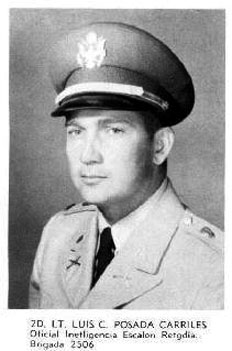Sunday, November 12, 2006
Friends In High Places

A.L. Bardach on the political skullduggery surrounding the case of Luis Posada Carriles:
Not long after Posada's arrest, FBI and Homeland Security agents began to phone me, seeking information about the New York Times series. One agent came right out and asked if I'd share my research materials -- as well as my copies of FBI and CIA files on Posada. "Do us a favor," he said. "We can't find ours." I laughed politely, assuming it was a strained attempt at humor. But he wasn't kidding.
In August 2003, the Miami bureau of the FBI made the startling decision to close its case on Posada. Subsequently, according to FBI spokeswoman Judy Orihuela, several boxes of evidence were removed from the bureau's evidence room, or the "bulky," as it is known. Among the documents that disappeared was the original signed fax that Posada had sent to collaborators in Guatemala in 1997, complaining of the U.S. media's reluctance to believe reports about a series of bombings in Cuba, which he hoped would scare tourists and investors away from Castro's island. ...
Posada fretted to me that the fax could cause him problems with the FBI. But he had no need to worry.
Hector Pesquera, the special agent in charge of the Miami FBI bureau at the time, showed little interest in Posada's case. To his agents' distress, he enjoyed socializing with Miami's hard-line exile politicians, and denied agents' requests for wiretaps on Bosch, known as the godfather of the paramilitary groups, as well as other militants suspected of ongoing criminal activity. Pesquera shuttered investigations into exile militants, agents say, before retiring in December 2003.
Without the materials that were removed from the evidence room, which also included cables and money transfers between Posada and his collaborators in the Cuban bombings, a criminal prosecution of Posada is severely hobbled. Orihuela, the FBI spokeswoman, explained that "the supervisory agent in charge and someone from the U.S. attorney's office would have had to sign off" before evidence is removed and destroyed. She confirmed that the approval to dispose of the evidence was given by the case agent on Posada, who happened to be Ed Pesquera -- Hector's son.
Though Posada's case was reopened in May 2005 and is now pending, the decision to close it in the first place baffled many longtime FBI and Miami Dade police investigators. Rarely had Posada been more active. In addition to the Cuban bombing campaign, he and three comrades had been arrested in Panama in 2000 in connection with an attempt to assassinate Castro. ...
Later, while I was working on an article about Posada for the current issue of the Atlantic Monthly, one of his attorneys told me that Posada's case "is being handled at the highest levels" of the Justice Department. All they have to do to detain Posada indefinitely, he explained, is to have Attorney General Alberto R. Gonzales certify him as a national security threat. "But they're not going to do that," he added. "That would create problems for the Bush people with their Cuban-exile base in Miami." In other words, the government does not want to mount its own case -- and risk alienating Cuban American allies. Better it should get reporters to build its case. ...
The FBI and the Justice Department are filled with dedicated public servants, but it is the political appointees who make the final decisions. And for them, Posada may be a man who knows too much. His attorneys say that he was a paid CIA agent from 1959 until the mid-1980s. Indeed, upon his "escape" from prison in 1985, Posada promptly found employment running the Iran-contra field operation in El Salvador. Bosch, his co-defendant in the Cuban plane bombing, was championed by none other than Jeb Bush in his bid for U.S. residency, which was granted in 1991 by President George H.W. Bush over the objections of the FBI, the CIA and the Justice Department.


